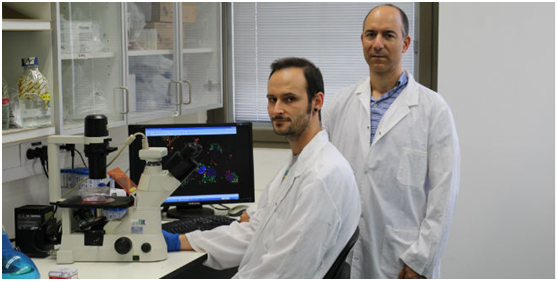By Judy Siegel-Itzkovich from Breaking Israel News

HU Prof. RotemKarni (right) and doctoral student Maxim Mogilevsky in the lab. (HebrewUniversity Courtesy)
Glioblastoma soundsfrightening – and it is. This malignancy is the most aggressive cancer thatbegins inside the brain, and patients who are diagnosed with it usually haveonly about 11 to 20 months to live. There are rare cases, about 3% to 5% ofvictims, who survive for five years or more.
Initial symptoms are not specific andmay include nausea, headaches, personality changes and even signs of a stroke.But the cancer, which usually begins around age 64, often causes patients todecline quickly, even to unconsciousness. One of the main problems in treatingthis cancer is that its cells quickly build up a resistance to chemotherapy.
The cause of the tumor, which occurs inthree people per 100,000 per year and usually develop in the brain’s whitematter, is not known. There are genetic risk factors, such as suffering fromneurofibromatosis or Li-Graumeni syndrome. Another risk factor, but unexplained,is having previously undergone radiation therapy.
There is no known way to preventglioblastoma, and treatment is difficult because the tumor cells are veryresistant to conventional therapies and the brain is susceptible to damage fromconventional therapy and has a very limited capacity to fix itself.
Another impediment to treatment is thatmany drugs can’t cross the blood-brain barrier so they could fight the tumor.When there is time for treatment, surgery – followed by chemotherapy and radiationtherapy– may be offered. It is unclear whether trying to remove all or simplymost of the cancer is better. Yet glioblastomas are usually resistant toconventional chemotherapy, and even after such procedures, the cancer usuallycomes back.
But now, researchers at the Hebrew University of Jerusalem, Israel haveproposed a new treatment for glioblastoma – the type of cancer from which JohnMcCain suffered – that has the potential to improve and lengthen patients’lives.
Prof. Rotem Karni and his team at theuniversity’s Institute for Medical Research-Israel Canada have just publishedtheir promising results in the journal Nucleic Acids Research.
As part of their research, Karni anddoctoral student Maxim Mogilevsky designed a molecule that inhibitsglioblastoma tumor growth by regulating the proteins it produces. The MKNK2gene produces two different protein products through a process called “RNA alternativesplicing.” Ironically, these proteins have two opposing functions –MNK2ainhibits cancer growth, while MNK2b supports cancer growth.
The new Hebrew University moleculeshifts the splicing of MKNK2 so that production of the tumor-stimulating proteindecreases, while production of the tumor-suppressing protein increases. As aresult, cancerous tumors decrease or die-off completely.
“Notonly can this breakthrough molecule kill tumor cells on its own, but it has thepower to help former chemotherapy-resistant cells become chemotherapy-sensitiveonce again,” explained Karni.
In his study, tumors shrank or died offcompletely in mice with human glioblastoma tumor cells that were treated withthis new molecule. This did not occur in mice that were treated with aninactive molecule. “Our research presents a novel approach for glioblastomatreatment. In the future, we’ll be able to tailor treatments for patients basedon the amount of cancer-inhibiting proteins that their tumors produce,” addedKarni.
A patent for this technology has beenregistered and granted in the United States and Europe through Yissum, HebrewUniversity’s research and development company. The research was financed by theGerman-Israel Foundation, the Israel Innovation Authority, the Israel ScienceFoundation, the Israel Cancer Research Fund, the Israel CancerAssociation, the Henry & Merilyn TaubFoundation and the Carol Epstein Foundation.

